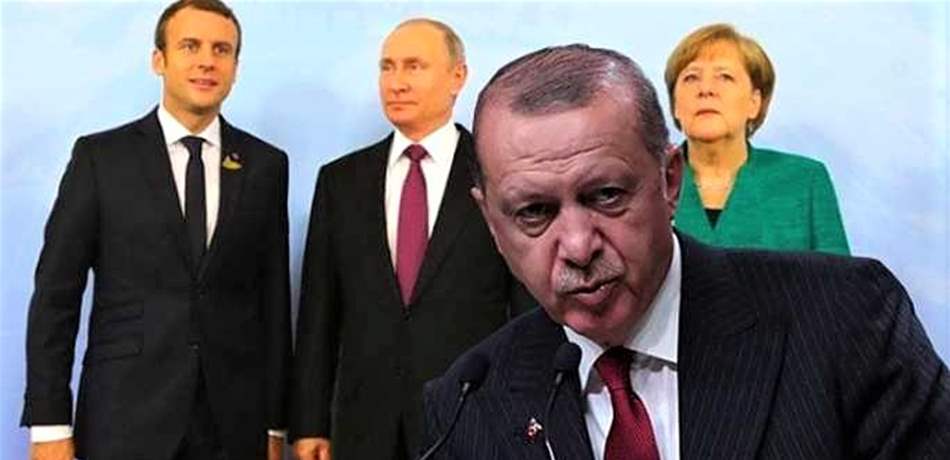Turkish President Recep Tayyip Erdoğan hosts Russian, German, and French leaders today in a summit on Syria’s 92-month conflict.
The meeting is likely to feature discussion — and possibly divisions — over Bashar al-Assad’s future, assistance for reconstruction, and the status of Kurdish-controlled areas in north and east Syria.
Last month Turkey secured the immediate partition of the country when it obtained Russian agreement to a demilitarized zone around opposition territory, notably Idlib Province, in northwest Syria. The accord suspended a Russian-regime offensive to reoccupy the area.
The arrangement is holding despite occasional regime shelling, including an attack on Friday which killed seven people in two villages in Idlib.
SE. #Idlib: a teacher, 3 of his children & 2 more civilians were killed tonight by indiscriminate Regime artillery (MLRS) shelling on village of Rofa. #Syria https://t.co/98P7YLsblt pic.twitter.com/Sh4oAvA0LZ
— Qalaat Al Mudiq (@QalaatAlMudiq) October 26, 2018
Erdoğan is now expected to press for a political transition which will include the departure of Assad from power, an objective shared by the French.
Russia, the essential ally of the regime, has had doubts about the Syrian President but has refused to endorse a transition in which he steps aside.
But Moscow’s emphasis on international funds for reconstruction, after more than $380 billion damage from the conflict, will face the condition of a political resolution accompanying any support.
A scene from Aleppo, 22 months after pro-Assad forces reoccupied the eastern part of Syria’s largest city:
Friend sent me a video from Aleppo – many parts of the city's suburbs are still in ruins and deserted. You can see the newly built blocks but whole areas will stay destroyed. "Russians are in charge everywhere" pic.twitter.com/xG9d0INJwM
— Ruslan Trad (@ruslantrad) October 26, 2018
Erdoğan signalled on Friday that he also wants pressure on areas taken by the US-supported, Kurdish-led Syrian Democratic Forces since 2015 from the Islamic State.
Turkey has been negotiating with the US over the oversight of Manbij, in Aleppo Province at the western edge of the Kurdish area of control. But the Turkish President said yesterday that attention should turn to territory to the east, including the SDF’s hold east of the Euphrates up to the Iraqi border.
Ankara considers the Kurdish militia YPG, the leading faction in the SDF, to be part of the Turkish Kurdish insurgency PKK.
UN Envoy: Assad Regime Has Blocked Constitutional Committee
UN envoy Staffan De Mistura has acknowledged that the Assad regime is blocking the formation of a Constitional committee towards a political resolution of the conflict.
De Mistura told the UN Security Council that the Syrian Foreign Ministry refused, in a meeting with the envoy on Wednesday in Damascus, to accept the UN had any role in setting up the committee.
The Ministry also objected to the involvement of independent members, including women and representatives of ethnic groups and civil society organizations, who are supposed to be 1/3 of the committee alongside 1/3 from the regime and 1/3 from opposition groups.
De Mistura, who steps down as UN envoy at the end of November, was present in Istanbul at the summit of the four leaders hosted by Turkey’s President Erdoğan.
Russia initially proposed the committee at a meeting in the southern Russian city Sochi in January. However, Moscow has backed away from the role given to the UN to establish the membership.
The Assad regime’s Foreign Minister Walid al-Moallem bluntly rebuffed De Mistura after their Wednesday encounter:
The Constitution and everything related to it is a purely sovereign affair decided by the Syrian people without foreign interference….Some sides and states seek are seeking to interfere and impose their will on the Syrian people.
Syria Daily, Oct 25: Assad Regime Says Goodbye to UN Envoy
Iran, the key backer of the Assad regime alongside Russia, supported the rejection of De Mistura in a commentary via State news agency IRNA, claiming that the formation of the committee is a “Western pretext for crisis in Syria”.
But the head of the opposition High Negotiations Committee, Nasr Hariri, said the committee should be set up before the next round of intra-Syrian talks.
Speaking at a press conference in Moscow on Friday, ahead of his meeting with Russian Foreign Minister Sergei Lavrov, Hariri said Bashar al-Assad must resign:
The person who participated in killing and burning the Syrian people, the person who destroyed the infrastructure, hospitals, schools, universities, roads, and airports — this person cannot be responsible of receiving funds for reconstruction.

